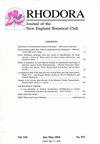Crowley's Ridge—Mixed Mesophytic Forests in Northeastern Arkansas
IF 0.2
4区 生物学
Q4 PLANT SCIENCES
引用次数: 0
Abstract
ABSTRACT. Crowley's Ridge is a low, narrow, eroded ridge that rises above the uniformly flat alluvial floodplain in the northeastern quadrat of Arkansas. The ridge is geologically unique because it consists largely of wind-blown soil (loess) deposited during the late Pleistocene. During June 2008, quantitative data on the composition and structure of all strata of forest vegetation were collected from ten 0.1 ha plots at two general localities on the southern portion of Crowley's Ridge. Acer saccharum (sugar maple) was the leading dominant in the large/ medium-sized tree stratum, followed by Quercus rubra (northern red oak), Q. velutina (black oak) and Q. stellata (post oak), all with importance value indices > 10. Other species present included Carya alba (mockernut hickory), Fraxinus americana (white ash), Fagus grandifolia (American beech), and Liriodendron tulipifera (tulip-tree). Except for post oak, these trees tend to be characteristic of the classic Mixed Mesophytic Forest Region of the southeastern United States. In six of the 10 plots, the combined importance values of species typically associated with mixed mesophytic forests represented 84% to 100% of the large/ medium-sized tree stratum. Twenty-three different species were recorded in this stratum, a level of diversity that is comparable to a mixed mesophytic forest. As such, the data presented herein indicate that at least some forests on Crowley's Ridge apparently represent the westernmost examples of this forest type.阿肯色东北部克罗利脊-混合叶生林
摘要克罗利山脊是一个低矮、狭窄、受侵蚀的山脊,位于阿肯色州东北部均匀平坦的冲积洪泛平原之上。山脊在地质上是独特的,因为它主要由晚更新世沉积的风吹土壤(黄土)组成。2008年6月,在Crowley's Ridge南部两个一般地点的10个0.1 ha样地收集了森林植被各层组成和结构的定量数据。糖槭(Acer saccharum)是大、中型乔木层的主要优势树种,其次是北方红栎(Quercus rubra)、黑栎(Q. velutina)和后栎(Q. stellata),重要值指数均为bbb10。其他物种包括山核桃、美洲白蜡树、美洲山毛榉和郁金香。除了后橡树,这些树木往往是典型的美国东南部混合中生森林地区的特征。在10个样地中的6个样地,典型中叶生混交林相关树种的综合重要值占大/中型乔木层的84% ~ 100%。在这个地层中记录了23种不同的物种,其多样性水平可与混合的中生植物森林相媲美。因此,本文提供的数据表明,至少克劳利岭上的一些森林显然代表了这种森林类型的最西端。
本文章由计算机程序翻译,如有差异,请以英文原文为准。
求助全文
约1分钟内获得全文
求助全文
来源期刊

Rhodora
生物-植物科学
CiteScore
0.40
自引率
0.00%
发文量
40
审稿时长
>12 weeks
期刊介绍:
This peer-reviewed journal is devoted primarily to the botany of North America and accepts scientific papers and notes relating to the systematics, floristics, ecology, paleobotany, or conservation biology of this or floristically related regions.
 求助内容:
求助内容: 应助结果提醒方式:
应助结果提醒方式:


